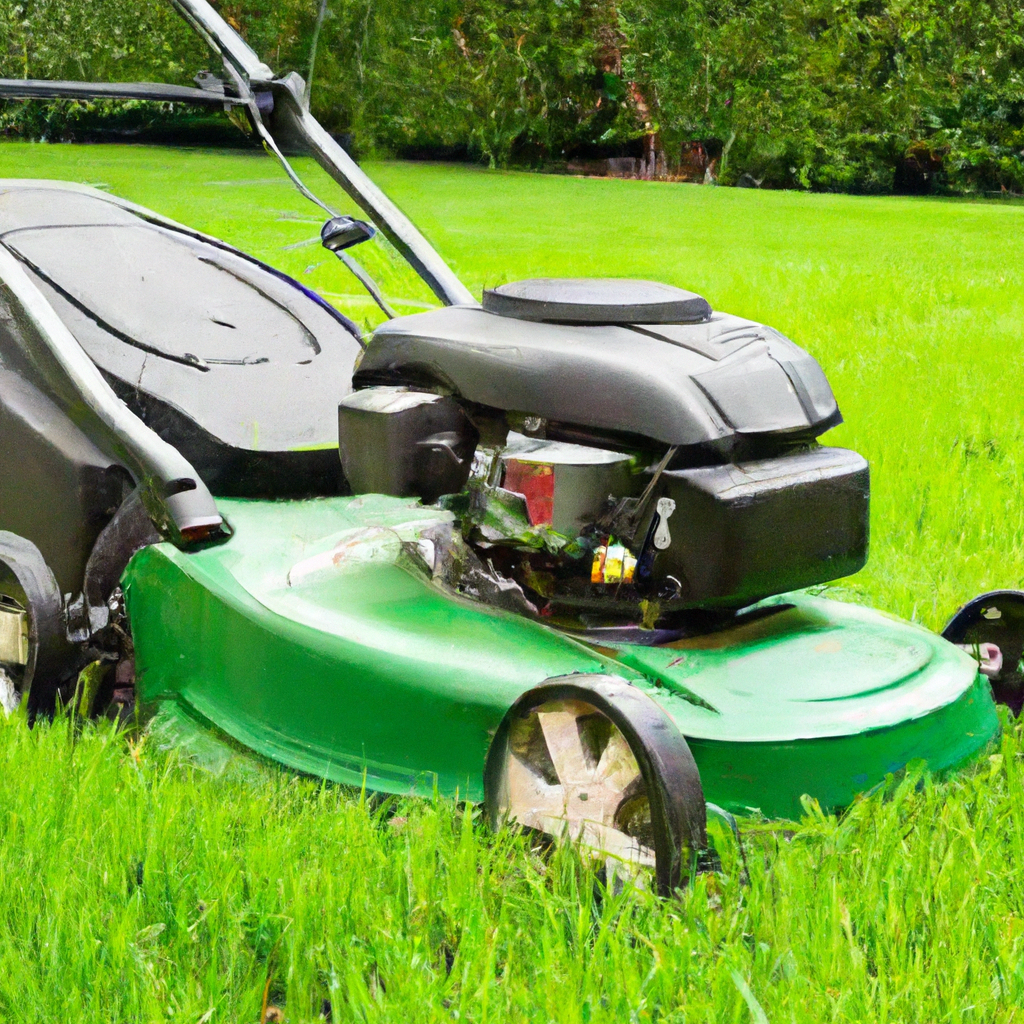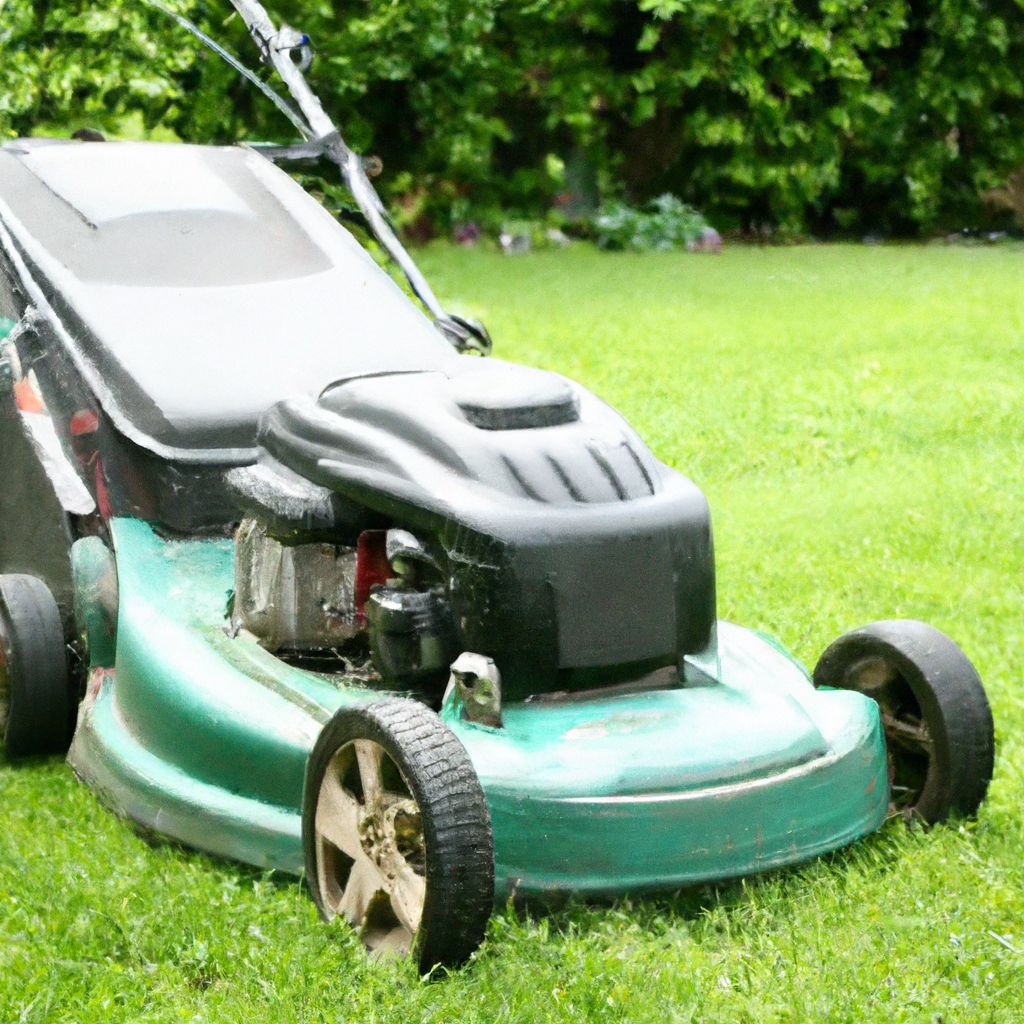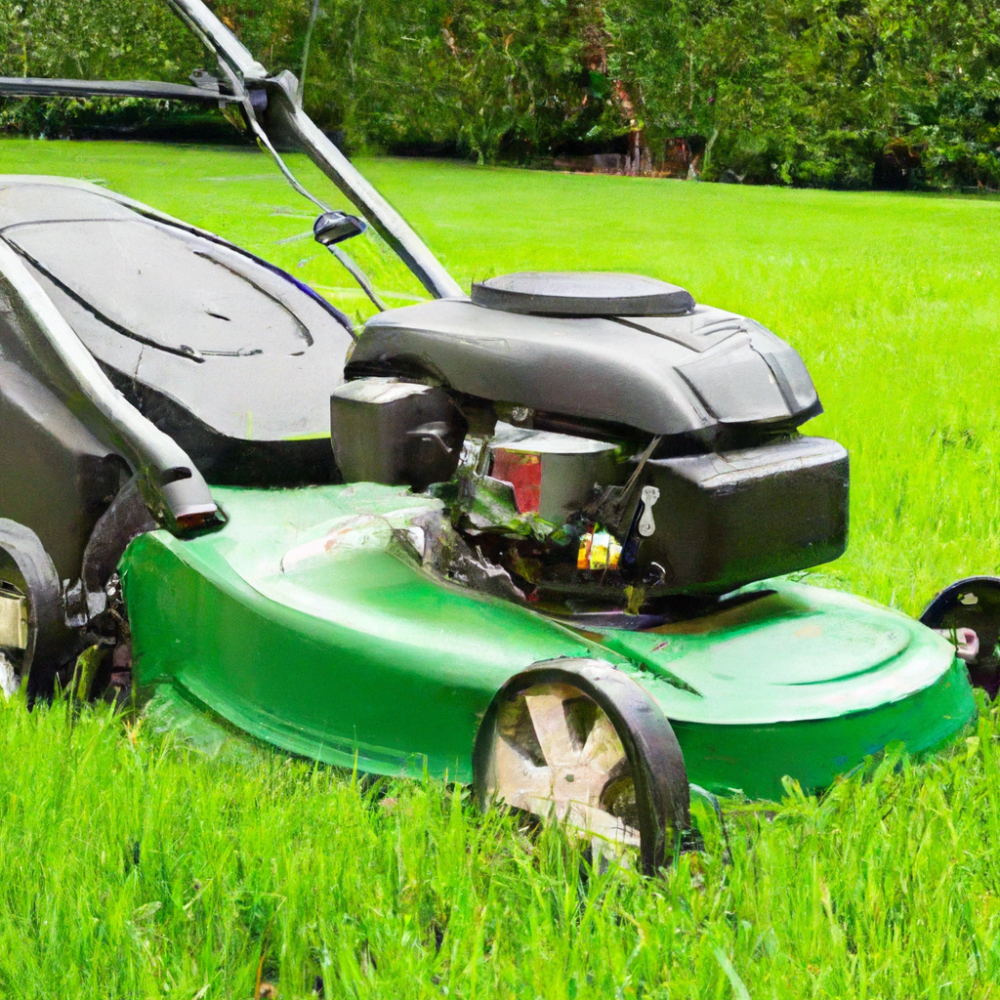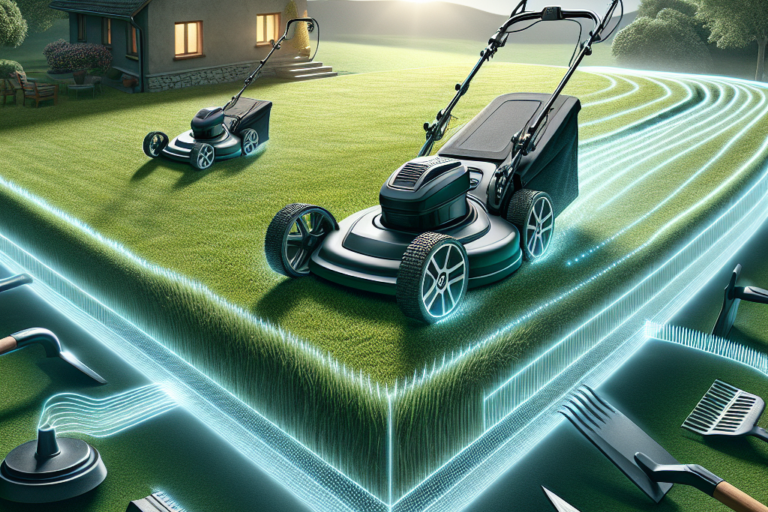If your lawn is looking more like a thick jungle than a neatly manicured field, you might be wondering if your electric lawn mower can handle the task. After all, with its quiet hum and eco-friendly design, it’s an appealing option for maintaining your outdoor space. But can it really tackle the challenge of thick, dense grass? In this article, we will explore the capabilities of electric lawn mowers and provide you with the information you need to make an informed decision about their suitability for your lawn care needs. Yes, they certainly can! Electric lawn mowers have come a long way in terms of power and performance, making them a viable option for tackling even the toughest grass. In this comprehensive guide, we will explore the advantages of electric lawn mowers, discuss their power and performance capabilities, delve into their mulching capability, provide tips for efficient cutting, discuss maintenance and care, consider additional factors to keep in mind, and compare electric mowers to their gas-powered counterparts. By the end of this article, you’ll have a thorough understanding of electric lawn mowers and whether they are the right choice for your lawn care needs.

Advantages of Electric Lawn Mowers
Environmentally Friendly
One of the biggest advantages of electric lawn mowers is their environmental friendliness. Unlike gas-powered mowers, electric mowers produce zero emissions, helping to reduce air pollution and minimize our carbon footprint. By opting for an electric mower, you’re contributing to a greener, healthier environment.
Quieter Operation
Say goodbye to the ear-splitting noise of gas mowers! Electric mowers operate significantly quieter, creating a more peaceful mowing experience for you and your neighbors. This is particularly beneficial if you have young children, pets, or enjoy mowing early in the morning or late in the evening when noise may be a concern.
Low Maintenance
Electric mowers require minimal maintenance compared to their gas-powered counterparts. With no oil changes, spark plug replacements, or fuel system maintenance required, you can save time and effort on upkeep. This not only simplifies your lawn care routine but also reduces long-term costs associated with maintenance and repairs.
Ease of Use
Electric mowers are known for their user-friendly features. They are typically lighter in weight than gas mowers, making them easier to maneuver around your yard. Additionally, electric mowers start with a simple push of a button, eliminating the need for frustrating pull-starts. Whether you’re an experienced gardener or a novice in lawn care, electric mowers offer a hassle-free mowing experience.
Power and Performance
Motor Power
When considering an electric mower, one important factor to consider is the motor power. Electric mowers are available in a range of motor power options, typically measured in volts. The higher the voltage, the more powerful the mower. If you have a larger yard or anticipate dealing with thicker and denser grass, opting for a higher voltage mower would be beneficial to ensure sufficient power for the job.
Cutting Width
The cutting width of an electric mower refers to the width of the cutting deck, indicating the amount of grass it can cut in a single pass. A wider cutting width means less time spent mowing, as more grass is cut with each sweep. Consider the size of your lawn and the time you have available for mowing when selecting the cutting width of your electric mower.
Cutting Height Adjustments
Different types of grass require different cutting heights to thrive. Electric mowers usually come with adjustable cutting height options, allowing you to customize the length of your grass. This feature is particularly important when tackling thick grass, as a higher cutting height can prevent the mower from becoming overwhelmed and help achieve a more even cut.
Collection Capacity
If you prefer bagging your clippings instead of mulching, the collection capacity of your electric mower is a crucial consideration. A larger collection capacity means fewer stops to empty the bag, allowing for a more efficient mowing session. Take note of the collection capacity of different models to find the one that best suits your needs.
Mulching Capability
Mulching Functionality
One of the standout features of electric mowers is their mulching functionality. When equipped with a mulching blade, electric mowers can finely chop the grass clippings into tiny pieces and evenly distribute them back onto the lawn. This creates a nutrient-rich natural fertilizer that nourishes the soil and promotes a healthier, greener lawn.
Benefits of Mulching
Mulching offers several benefits for your lawn. It helps retain moisture, reducing the need for frequent watering. The finely chopped grass clippings act as organic matter, improving the soil’s nutrient content. Mulching also reduces the amount of yard waste produced, as the clippings are recycled back into the lawn. Overall, mulching with an electric mower is a sustainable and cost-effective way to maintain a lush, thriving lawn.
Handling Thick Grass
Motor Strength
When it comes to handling thick grass, the motor strength of an electric mower is crucial. Look for a mower with a powerful motor that can provide the necessary torque to cut through dense grass. Higher voltage motors generally offer more strength and can handle thicker grass with ease. By choosing the right motor strength, you can ensure that your electric mower can tackle even the most stubborn patches of grass.
Cutting Techniques
To effectively handle thick grass, it is essential to employ proper cutting techniques. Start by adjusting the cutting height to a higher setting, allowing the mower to take on thicker blades of grass without straining the motor. Take your time and mow in overlapping rows, ensuring an even and thorough cut. For particularly dense areas, it may be necessary to go over them multiple times to achieve the desired result.
Regular Maintenance
Regular maintenance is crucial for keeping your electric mower in top condition, especially when dealing with thick grass. Keep the cutting deck clean and free from debris to prevent clogging, which can hamper the mower’s ability to effectively cut thick grass. Additionally, ensure that the blades are sharp and in good condition, as dull blades can struggle to cut through dense grass. Regularly inspect and clean the underside of the deck, removing any residue that may affect the mower’s performance.

Tips for Efficient Cutting
Preparation
Before you start mowing, prepare your lawn for the most efficient cutting experience. Remove any debris, sticks, or stones from the area to prevent damage to the mower or uneven cutting. Trim any overhanging branches or shrubs that may obstruct the mower’s path. Taking a few minutes to prepare your lawn before mowing can save you time and prevent unnecessary interruptions.
Slow and Steady
When using an electric mower, adopting a slow and steady pace is key to achieving a clean, professional-looking cut. Rushing through the mowing process can result in uneven cutting and missed spots. Take your time, and let the mower do the work. Slow, deliberate movements ensure a thorough and even cut, leaving your lawn looking pristine.
Frequent Emptying
To maintain optimal cutting performance and prevent clogging, it is important to empty the grass bag or mulching compartment frequently. Overfilling can hamper the mower’s ability to effectively cut grass, resulting in clumping or uneven cutting. Regularly check the grass collection level and empty it before it reaches maximum capacity for efficient and uninterrupted mowing.
Sharpening Blades
Keeping the blades of your electric mower sharp is crucial for achieving clean, precise cuts. Over time, blades can become dull, resulting in ragged grass edges and an overall untidy appearance. Sharpening the blades periodically ensures a clean cut and prevents unnecessary strain on the motor. Consult the manufacturer’s guidelines for the recommended sharpening frequency and technique.
Maintenance and Care
Cleaning the Deck
Regularly cleaning the deck of your electric mower is essential for maintaining its performance and longevity. Grass clippings and debris can accumulate on the underside of the deck, leading to clogging and reduced cutting efficiency. After each use, turn off the mower and disconnect it from the power source. Use a brush or hose to remove any residue, ensuring that the deck is thoroughly clean before storing.
Blade Maintenance
Proper blade maintenance is crucial for optimal cutting performance. It is recommended to inspect the blades regularly for any signs of damage or wear. If you notice any nicks or dents, consider replacing the blades or taking them to a professional for sharpening. Keeping the blades in good condition not only ensures a clean cut but also minimizes strain on the motor, maximizing the mower’s lifespan.
Battery Care
If you own a cordless electric mower, proper battery care is essential for optimal performance. Follow the manufacturer’s guidelines for charging the battery and avoid overcharging it. When not in use, store the battery in a cool, dry place, away from direct sunlight or extreme temperatures. Regularly inspect the battery for any signs of wear or damage, and replace it if necessary.
Additional Considerations
Corded vs Cordless Electric Mowers
When choosing an electric mower, you’ll come across corded and cordless options. Corded mowers rely on an electrical outlet for power and provide uninterrupted operation, while cordless mowers operate on rechargeable batteries, offering greater mobility. Consider the size of your lawn and the availability of power outlets when deciding between corded and cordless mowers.
Run Time and Battery Life
If you opt for a cordless electric mower, it is essential to consider the run time and battery life. Higher capacity batteries can provide longer run times, allowing you to mow larger areas without interruption. Assess your lawn size and how long it typically takes to mow to determine the ideal battery capacity for your needs.
Size of Lawn
The size of your lawn plays a significant role in selecting the right electric mower. For smaller yards, a compact and lightweight model may suffice. However, larger lawns require a mower with a wider cutting width and a more powerful motor. Consider the size of your lawn to ensure that the electric mower you choose can effectively and efficiently cover the entire area.
Obstacles in the Yard
If your yard has numerous obstacles such as trees, flower beds, or pathways, maneuverability becomes a critical factor. Look for an electric mower with a compact design and good maneuverability, ensuring that it can easily navigate around obstacles. Some models even offer additional features like swiveling front wheels or adjustable handle height, further enhancing maneuverability.
Comparing Electric Mowers to Gas Mowers
Power Output
When comparing electric mowers to their gas-powered counterparts, power output is a key factor to consider. Gas mowers typically offer higher power output, making them better suited for larger yards and thicker grass. However, electric mowers have significantly improved in power, and high-end models can now rival the performance of gas mowers. Consider your specific needs and the size of your lawn when evaluating power output.
Noise Level
Gas mowers are notorious for their loud operation, often causing disturbance to both the user and their neighbors. On the other hand, electric mowers operate considerably quieter, allowing for a more peaceful mowing experience. If noise pollution is a concern, electric mowers are the clear winner, providing a more pleasant environment for both you and your community.
Maintenance and Upkeep
In terms of maintenance and upkeep, electric mowers have a clear advantage over gas mowers. Electric mowers require minimal maintenance, with no oil changes, spark plug replacements, or fuel system maintenance needed. Gas mowers, on the other hand, require regular maintenance tasks to keep them in top condition. Electric mowers save you time, effort, and money when it comes to maintenance.
Cost of Operation
The cost of operation is another important consideration when comparing electric mowers to gas mowers. Electric mowers are generally more cost-effective in the long run, as they don’t require gasoline or oil, resulting in lower fuel costs and less frequent maintenance. Gas mowers, on the other hand, can be more expensive to operate due to ongoing fuel and maintenance expenses. Assessing the long-term cost of operation can help you make an informed decision.
Conclusion
In conclusion, electric mowers offer a range of advantages that make them a compelling choice for lawn care needs. Their environmentally friendly nature, quieter operation, low maintenance requirements, and ease of use make them a popular option among homeowners. With improvements in power and performance, electric mowers can tackle even the thickest grass with ease. The mulching capability of electric mowers provides additional benefits for lawn health and sustainability. By following tips for efficient cutting and proper maintenance and considering additional factors like the size of your lawn and maneuverability needs, you can select the ideal electric mower for your specific requirements. When comparing electric mowers to gas mowers, factors like power output, noise level, maintenance, and cost of operation come into play. Ultimately, the choice between electric and gas comes down to personal preference and specific lawn care needs. With all the information provided in this comprehensive guide, you are now equipped to make an informed decision and achieve a beautifully manicured lawn with an electric mower.






